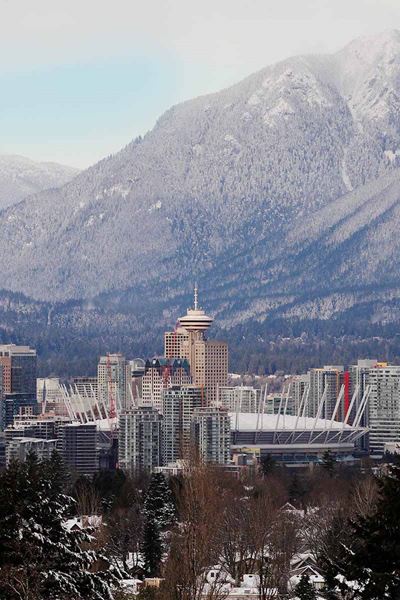When is the best time to visit Vancouver?
- In general, it’s pleasant to walk and do outdoor activities during June - September.
- If you want to avoid wet weather, then your choice is January, November, December with the lowest chance of rain.
Average weather in Vancouver in different months
May, June, July, August usually has good weather. Average maximum temperature reaches +23°C during July.
In March, April, September, October, November the weather is average. Expect around 90 rainy days, and the precipitation amounts to approximately 300 mm in November.
January, February, December bring not the best weather. December is the coldest month with the temperature going down to +3°C.
Climate in Vancouver
| Jan | Feb | Mar | Apr | May | Jun | Jul | Aug | Sep | Oct | Nov | Dec |
|---|---|---|---|---|---|---|---|---|---|---|---|
| Maximum Temperature | |||||||||||
| +14°C | +14°C | +21°C | +26°C | +33°C | +40°C | +35°C | +35°C | +31°C | +27°C | +18°C | +14°C |
| Average Maximum Temperature | |||||||||||
| +6°C | +8°C | +10°C | +13°C | +17°C | +20°C | +23°C | +23°C | +19°C | +14°C | +9°C | +6°C |
| Minimum Temperature | |||||||||||
| -13°C | -14°C | -6°C | -1°C | +2°C | +6°C | +8°C | +8°C | +5°C | -8°C | -13°C | -14°C |
| Avg. water temperature | |||||||||||
| +8°C | +8°C | +8°C | +8°C | +10°C | +11°C | +12°C | +13°C | +12°C | +12°C | +10°C | +9°C |
| Humidity, % | |||||||||||
| 86 | 81 | 79 | 75 | 74 | 73 | 72 | 74 | 78 | 83 | 84 | 86 |
| Rain, mm | |||||||||||
| 249 | 171 | 203 | 159 | 104 | 84 | 52 | 54 | 105 | 212 | 300 | 262 |
| Snow, mm | |||||||||||
| 15 | 12 | 3 | 0 | 0 | 0 | 0 | 0 | 0 | 0 | 3 | 14 |
| Average wind speed, m/s | |||||||||||
| 3 | 3 | 3 | 3 | 3 | 3 | 3 | 2 | 2 | 3 | 3 | 3 |
| Sunny Days | |||||||||||
| 2 | 2 | 2 | 3 | 3 | 3 | 9 | 8 | 6 | 3 | 2 | 1 |
| Cloud Days | |||||||||||
| 8 | 7 | 8 | 8 | 12 | 12 | 12 | 13 | 11 | 9 | 6 | 7 |
| Rainy Days | |||||||||||
| 18 | 16 | 19 | 19 | 15 | 15 | 10 | 9 | 12 | 18 | 22 | 18 |
| Snowy Days | |||||||||||
| 4 | 3 | 1 | 0 | 0 | 0 | 0 | 0 | 0 | 0 | 1 | 4 |
Average Temperature
Water temperature
Humidity
Rain
Snow
FAQ
What is the hottest month in Vancouver?
What is the coldest month in Vancouver?
Is Vancouver worth visiting in winter?
When does it rain the least in Vancouver?
Other cities in Canada
Monthly weather in Vancouver
Source of the data
For this page, we’ve looked at the typical weather in Vancouver, based on historical hourly weather data from January 1, 1979, to December 31, 2023.
For past dates, we show actual recorded data at the location at that time. Forecasts are based on recorded weather during that day of the year, averaged over the total years for which we have records (unless stated otherwise). The daily temperature is the highest recorded temperature in the shadow during that day.

